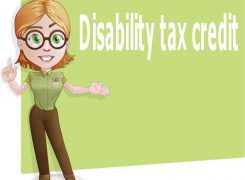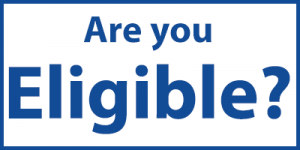
When most people talk about disabilities, we often think about people who can’t see, hear, walk or have lost a limb. And although these types of physical or mental impairments are considered disabilities, there are also many other medical conditions that may be eligible; i.e. Crohn’s, Colitis, IBS, Parkinson’s, MS, Mental Illness, Learning Disability…the list goes on as you can see from my A-Z list below.
So what is it that I am referring to? The Disability Tax Credit (DTC) is a credit that is claimed on your personal tax return. Your doctor is required to complete form T2201 and once CRA approves it, this credit could be claimed. Qualifying for the DTC does not mean that you can not work.
In addition to the DTC, there are other types of benefits, credits and rebates. Some require the disability tax credit as approved by CRA while others may not be related at all. These include:
- Fuel Tax Rebate for Persons with Disabilities—This is a BC credit for which you can receive up to $500 per year on the fuel you pay. This rebate is not linked to the DTC however there is criteria that must be met.
- Designated Parking—Most people are familiar with this one. It is available to more than just those in wheelchairs, or who use other mobility aids, including crutches and canes. It could also be for someone whose health prevents them from walking very far or for other medical reasons.
- Registered Disability Savings Plan (RDSP) —Linked to the DTC and for those under the age of 60, you can set up this RDSP savings plan (with most banks or credit unions) whereby the government will also contribute. Based on your family income, you can receive up to $3,500 when you contribute $1,500 per year. A further $1,000 is available to those with low income and not able to make any contributions at all.
- Attendant Care—Eligible for the DTC, your housecleaning costs can be claimed under your medical expenses. Or other attendant care services as required.
As I referred to above, there is also the Disability for CPP purposes. To be eligible to receive CPP Disability, the disability must be both “severe” and “prolonged”, and it must prevent you from being able to work at any job on a regular basis. Receiving CPP Disability does not guarantee your eligibility for the Disability Tax Credit or any other rebate/benefit as noted above.
***This blog is for information only and not to be used as tax advice or planning without first seeking professional advice. Information is subject to change without notice.
Remember to always seek the advice of a Professional CPA.
A
- Amputation
- Alzheimer’s Disease
- Amyotrophic Lateral Sclerosis (Lou Gehrig’s disease)
- Ankle Surgery
- Anorexia Nervosa
- Anxiety Disorders
- Arthritis
- Asperger Syndrome
- Asthma
- Attention Deficit
- Attention Deficit Disorder
- Attention Deficit Hyperactivity Disorder
- Auditory Processing Disorder
- Autism
- Auto-Immune Disorder
B
- Back Injury
- Bi-Polar Disorder
- Bladder Disorder
- Blindness
- Bowel Disorder
- Brain Injury
- Brain Tumour
- Broken Bone(s)
C
- Cancer Cavus Foot
- Cerebral Hemorrhage
- Cerebral Palsy
- Chemical Sensitivities
- Chromosome Anomaly
- Chronic Fatigue Syndrome
- Chronic Inflammatory
- Chronic Obstructive Pulmonary Disease (COPD)
- Chronic Pain
- Crohn’s Disease
- Cognitive Impairment
- Congenital Adrenal Hyperplasia
- Congenital Heart Defect
- Congestive Heart Failure
- Coronary Artery Disease
- Cystic Fibrosis
D
- Deafness
- Degenerative Disc Disease
- Demyelinating Polyneuropathy
- Dementia
- Depression
- Developmentally Delayed (DD)
- Dexterity Issues
- Diabetes
- Diabetes (Type 1)
- Dissociative Identity Disorder
- Down’s Syndrome
- Dressing (can’t dress or takes significantly longer)
- Dyslexia
E
- Electrocution
- Elimination (bowel or bladder functions)
- Emphysema
- Epilepsy
F
- Failed Back Syndrome
- Feeding (can’t feed themselves or takes significantly longer)
- Fetal Alcohol Syndrome
- Fibromyalgia
- Foot Ulcers
- Fused Wrist
G
- Generalized Anxiety Disorder
- Gout
H
- Hearing Loss
- Heart Attack
- Heart Defect
- Heart Disease
- Hepatitis
- Herniated Discs
- Hip Injury/Pain
- Hip Replacement
- HIV
- Huntington’s Disease
- Hypothyroidism
I
- Ileostomy
- Intellectual Disability
- Irritable Bowel syndrome (IBS)
J
- Juvenile Arthritis
K
- Knee Injury/Pain
L
- Learning Disability
- Lumbar Disc Disease
- Lupus
M
- Mobility Issues
- Mood Disorder
- Motor Vehicle Accident
- Multiple Sclerosis
- Muscular Dystrophy (MD)
- Myasthenia Gravis
- Myotonic Myopathy
N
- Nerve Damage
O
- Osteoarthritis
- Obsessive Compulsive Disorder
- Oppositional Defiant Disorder (ODD)
P
- Paralysation
- Physical Impairment
- Post-Polio Syndrome
- Parkinson’s Disease
- Personality Disorder
- Post Traumatic Stress Disorder
- Polycystic Kidney Disease
- Polyneuropathy
- Psychotic
R
- Rheumatoid Arthritis
S
- Scoliosis
- Social Anxiety Disorder
- Schizophrenia
- Speech Impairment
- Sleeping Disorder
- Spina Bifida
- Spinal Stenosis
- Selective Mutism
- Spastic Paralysis
- Spinal Disorder
- Spinal Injury/Pain
- Stroke
T
- Tendonitis
- Trigeminal Neuralgia
- Tourette’s Syndrome
V
- Vision Impairment
W
- Walking Impairment
